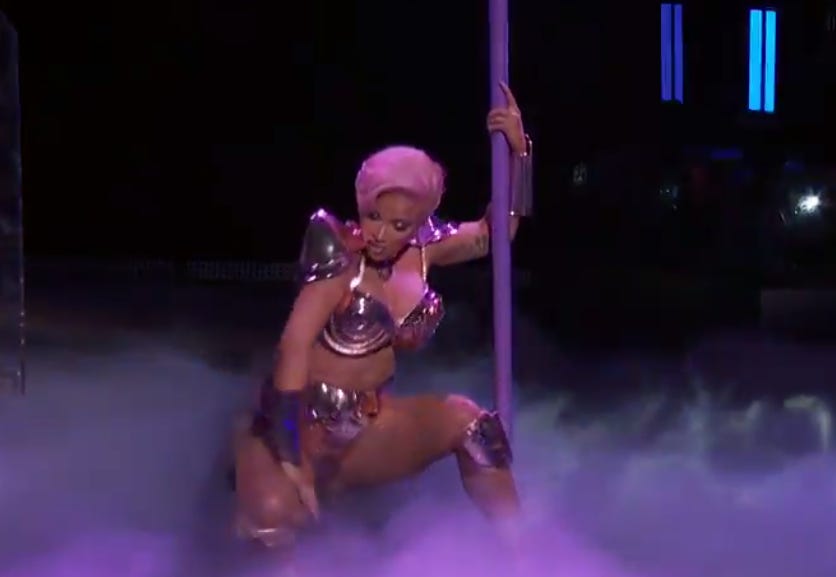A screenshot of Cardi B working a stripper pole during the 2021 Grammy Awards.
Those of you women who actually have an office to go to today: what’s it like showing up, knowing fellow workers watched Megan Thee Stallion and Cardi B’s soft porn performance on the Grammys? And Dua Lipa’s mock lingerie show?
The “Wet-Ass Pussy” singers did not empower you. They didn’t even empower themselves. They subtracted power from you.
Can you afford it?
Maybe you altered today’s clothing choices because of what you knew your coworkers saw. Maybe you dreaded how you might be viewed today, aware that pop-culture sexualization travels swiftly to almost every corner of society.
I don’t like to tell women, or other people who I am not, how to live. What to like. But I have been a man for a long time and I know how lots of men react to things like this.
They cheapen everything there is about women that’s resourceful and competitive and credible. They demonstrate that a woman is just a piece of ass.
At this moment, one of the most powerful politicians in America stands accused of reducing a half-dozen employees to nothing more than sexual objectives. New York Gov. Andrew Cuomo’s career is hanging by a thread.
He seems idiotic, having set aside the warning commonly spoken to men of his generation when they were boys: “Don’t let Herman run your life.” Herman is the demanding fellow who lives in a man’s underwear.
But Cuomo’s idiocy notwithstanding, women’s participation in their own objectification encourages arrogant, apparent narcissists like him on some level. Almost everywhere you turn your head, there’s a woman enriching herself in a way that tells men like Cuomo or Donald Trump they’re justified if they grab them by the pussy.
I’m sorry that sounds like the cops who used to ask rape survivors what they were wearing.
But if this degree of criticizing female participation in female objectification is merely “blaming the victim,” exactly how far would things need to go before women get mad at each other for dragging their gender down? For helping make it so ridiculously hard to rise above sexualization? Is there no limit to what women can do to undermine each other without fear of redress?
An old business adage asserts that “bad goodwill” is seven times more powerful than “good goodwill.” In other words, you have to do seven positive things to counteract one instance of bad publicity. How many female CEOs do you need to balance the influence of one Megan Thee Stallion?
More than seven, I bet. After all, the CEOs don’t have music videos.
A CNN review referred to the Megan Thee Stallion/Cardi B writhing, twerk-rich four-song set as “glorious” and “sexually positive.” It was indeed catchy and well-choreographed, more so than earlier videos of the same tunes.
But it was similarly sexually positive to a Cicero pole-dancing show. The main difference is that 39 million adults and children can’t fit into a Cicero strip joint.
Stripteasing, pornography and everything else that demeans women has been around since long before we were born. And women have always participated, for various reasons. But that doesn’t mean what’s happening now is not a change. “More” is a change.
More is more. And more yet may be on the way.
The pandemic year brought a significant increase in female comedians’ self-sexualization on Twitter, both photographically and in prose. I guess some are having a hard time getting attention otherwise, so they’re taking a page from exploitation film director Jim Wynorski, who once said that “breasts are the cheapest special effects in the business.”
I’ve seen several bios or pinned tweets that assert “I’m funny and I’ve got big boobs,” or use similar phrases. Some of these come and go, because they’re only funny once, though the boobs part never gets old, I guess.
Tweeted comedy bits of these artists seem to be mostly about naughty bits, as the Brits say, and their usage. But that’s not unusual. As Malcolm Muggeridge, the controversial English satirist, accurately said in 1953, “Good taste and humor are a contrast in terms, like a chaste whore.”
The comedians get healthy retweets. The problem is that the attraction to those employing this strategy is not so much the strength of their jokes, but prurient interest in their appearance and sexuality.
I think this trend is weakening as comedy clubs are on the brink of reopening. But I wonder, if it picks up again, what it bodes for the future. After all, TV producers often find actors among stand-up comics. And comics pitch pilots.
They usually invent shows that feature what they’re best at. So what is television going to look like in 2022? Is there going to be more objectification of women, by women?
If there is, maybe we’ll hear how the creators feel empowered, and how glorious that is.
It would be refreshing to hear from women who not only oppose men standing on their necks, but also their sisters helping the men find their footing.
Sign up to get Irv Leavitt’s “Honest Context” free in your inbox by clicking on the subscribe button.




Good column, Irv. It sounds like the show was pretty awful. Glad I skipped it.
I agree. I watched a bit of it and turned it off. It looked like a big step backward for women. Not empowering-- depressing.